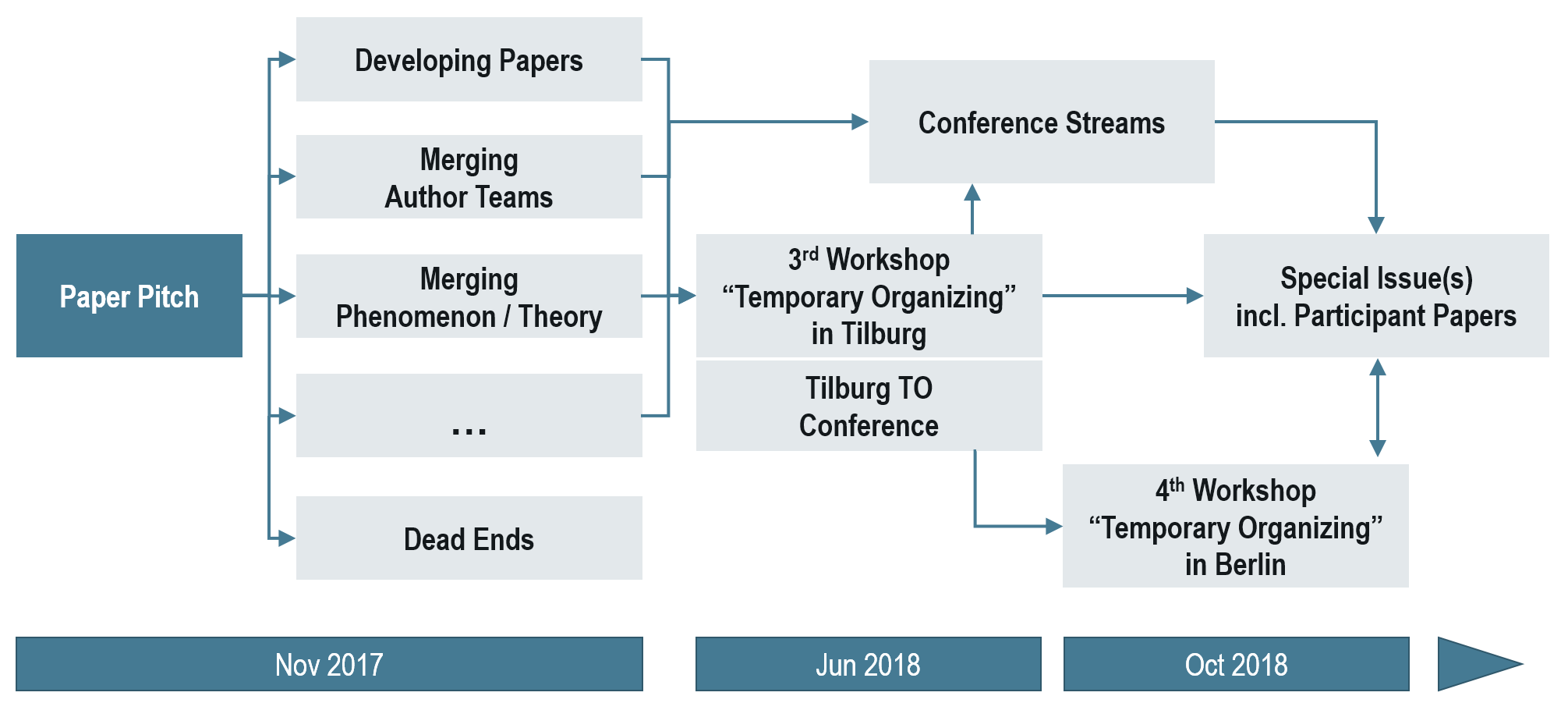Paper Pitches on Grand Challenges Research and the Embeddedness of Temporary Organizing
November 28th to 29th saw the second workshop of the DFG Scientific Network “Temporary Organizing” coordinated by Timo Braun (FU Berlin) and hosted by Hendrik Wilhelm (University of Cologne). In addition to the presentation and discussion of paper pitches prepared by the network members—responding either to call for papers on „Tackling Grand Challenges with Forms of Temporary Organizing“ (prepared by Blagoy Blagoev, Timo Braun, and Anja Danner-Schröder) or „The Embeddedness of Temporary Organizing“ (prepared by Stefan Bohn, Andranik Tumasjan, and Matthias Wenzel)—the participants enjoyed presentations by Davide Nicolini (Warwick Business School) and Shahzad (Shaz) Ansari (Cambridge University).
In their presentations, Davide and Shaz provided a review and an outlook on their work related to temporary organizing. Davide, in his presentation “Practice approaches and what can they say about temporary organizations (if anything)?” used the example of an Royal Scottish National Orchestra flash mob at the Glasgow Airport (available here) to illustrate the knotting of practices using objects. Shaz, in his presentation “Time and temporality in management studies”, used the Corpus Clock and Fair Trade certifications to uncover the implications of differentiating between process and clock time. Both presentations not only sparked discussions on their respective topics, but also fueled the feedback provided to the network members’ paper pitches. These paper pitches constitute a core element of the research network’s work program, as illustrated in the figure below.
The paper pitches prepared by the network members outlined current and ongoing research on the potential of temporary organizing to address grand challenges, the contextual embeddedness of temporary organizing, or both. Focusing on the call for papers on grand challenges, Blagoy Blagoev provided theoretical insights in his presentation “Handling the complexity of grand challenges through temporary organizing: A systemic lens”. Network members also pitched empirical projects designed to advance research on grand challenges. Specifically, Anja Danner-Schröder presented her project on “Emergent response groups as a form of temporary organizing to tackle grand challenges: The case of the refugee crisis in Europe”, and Julia Thaler outlined her work on “(Temporary) Organizing citizen engagement in the refugee crisis – A public management perspective”.
Pitches focusing on the embeddedness of temporary organizing featured two quantitative and one qualitative research project. Specifically, Federica Angeli and Jörg Raab presented their project on “Learning in and through temporary organizations: The case of contextual and domain knowledge accumulation in NGOs”, while Andranik Tumasjan pitched his paper on “When is temporary and decentralized work attractive for workers? The case of blockchain-technology-enabled decentralized labor markets”. Presenting their qualitative research project, Thomas Lübcke, Norbert Steigenberger, Indre Maurer and Hendrik Wilhelm provided insights into “Developing organizational routines under extreme conditions: Learnings from an international maritime rescue project in the Aegean Sea”.
Two pitches addressed both calls. Specifically, Matthias Wenzel presented his project on “From ‘projectification’ to ‘projectifying’: Toward a practice perspective on the spread of project work” while Timo Braun and Stephan Bohn provided insights into their project “Field-configuring projects? How the framing of electronic mobility is shaped in Germany”. These pitches were complemented by an idea sketch of Suntje Schmidt on the role of temporality and space in work arrangements. To combine academic endeavors with managerial practice, the members of the network also embarked on an offsite event at Detecon International GmbH, a business management consultancy heavily invested in ICT. The Detecon staff not only provided insights into temporality in current consulting work, but also allowed network members to explore Detecon’s office re-design project (report available here, only in German language).
The next network meeting, scheduled to take place at the Tilburg University (NL) in the run-up to the Tilburg Temporary Organizations Conference in June 2018, will provide the network members with a forum to discuss full papers based on the above pitches. Hope to meet you there!



